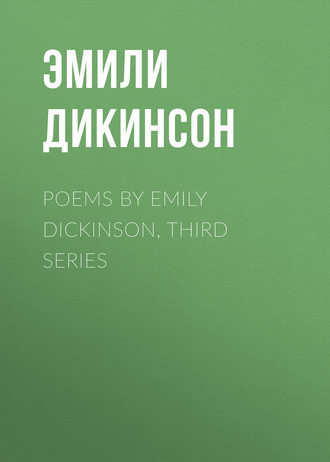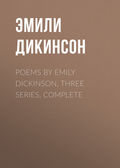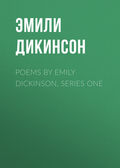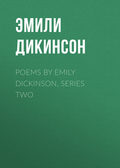полная версия

Эмили Дикинсон
Poems by Emily Dickinson, Third Series
XXXVI.
FAREWELL
Tie the strings to my life, my Lord,
Then I am ready to go!
Just a look at the horses —
Rapid! That will do!
Put me in on the firmest side,
So I shall never fall;
For we must ride to the Judgment,
And it's partly down hill.
But never I mind the bridges,
And never I mind the sea;
Held fast in everlasting race
By my own choice and thee.
Good-by to the life I used to live,
And the world I used to know;
And kiss the hills for me, just once;
Now I am ready to go!
XXXVII
The dying need but little, dear, —
A glass of water's all,
A flower's unobtrusive face
To punctuate the wall,
A fan, perhaps, a friend's regret,
And certainly that one
No color in the rainbow
Perceives when you are gone.
XXXVIII.
DEAD
There's something quieter than sleep
Within this inner room!
It wears a sprig upon its breast,
And will not tell its name.
Some touch it and some kiss it,
Some chafe its idle hand;
It has a simple gravity
I do not understand!
While simple-hearted neighbors
Chat of the 'early dead,'
We, prone to periphrasis,
Remark that birds have fled!
XXXIX
The soul should always stand ajar,
That if the heaven inquire,
He will not be obliged to wait,
Or shy of troubling her.
Depart, before the host has slid
The bolt upon the door,
To seek for the accomplished guest, —
Her visitor no more.
XL
Three weeks passed since I had seen her, —
Some disease had vexed;
'T was with text and village singing
I beheld her next,
And a company – our pleasure
To discourse alone;
Gracious now to me as any,
Gracious unto none.
Borne, without dissent of either,
To the parish night;
Of the separated people
Which are out of sight?
XLI
I breathed enough to learn the trick,
And now, removed from air,
I simulate the breath so well,
That one, to be quite sure
The lungs are stirless, must descend
Among the cunning cells,
And touch the pantomime himself.
How cool the bellows feels!
XLII
I wonder if the sepulchre
Is not a lonesome way,
When men and boys, and larks and June
Go down the fields to hay!
XLIII.
JOY IN DEATH
If tolling bell I ask the cause.
'A soul has gone to God,'
I'm answered in a lonesome tone;
Is heaven then so sad?
That bells should joyful ring to tell
A soul had gone to heaven,
Would seem to me the proper way
A good news should be given.
XLIV
If I may have it when it's dead
I will contented be;
If just as soon as breath is out
It shall belong to me,
Until they lock it in the grave,
'T is bliss I cannot weigh,
For though they lock thee in the grave,
Myself can hold the key.
Think of it, lover! I and thee
Permitted face to face to be;
After a life, a death we'll say, —
For death was that, and this is thee.
XLV
Before the ice is in the pools,
Before the skaters go,
Or any cheek at nightfall
Is tarnished by the snow,
Before the fields have finished,
Before the Christmas tree,
Wonder upon wonder
Will arrive to me!
What we touch the hems of
On a summer's day;
What is only walking
Just a bridge away;
That which sings so, speaks so,
When there's no one here, —
Will the frock I wept in
Answer me to wear?
XLVI.
DYING
I heard a fly buzz when I died;
The stillness round my form
Was like the stillness in the air
Between the heaves of storm.
The eyes beside had wrung them dry,
And breaths were gathering sure
For that last onset, when the king
Be witnessed in his power.
I willed my keepsakes, signed away
What portion of me I
Could make assignable, – and then
There interposed a fly,
With blue, uncertain, stumbling buzz,
Between the light and me;
And then the windows failed, and then
I could not see to see.
XLVII
Adrift! A little boat adrift!
And night is coming down!
Will no one guide a little boat
Unto the nearest town?
So sailors say, on yesterday,
Just as the dusk was brown,
One little boat gave up its strife,
And gurgled down and down.
But angels say, on yesterday,
Just as the dawn was red,
One little boat o'erspent with gales
Retrimmed its masts, redecked its sails
Exultant, onward sped!
XLVIII
There's been a death in the opposite house
As lately as to-day.
I know it by the numb look
Such houses have alway.
The neighbors rustle in and out,
The doctor drives away.
A window opens like a pod,
Abrupt, mechanically;
Somebody flings a mattress out, —
The children hurry by;
They wonder if It died on that, —
I used to when a boy.
The minister goes stiffly in
As if the house were his,
And he owned all the mourners now,
And little boys besides;
And then the milliner, and the man
Of the appalling trade,
To take the measure of the house.
There'll be that dark parade
Of tassels and of coaches soon;
It's easy as a sign, —
The intuition of the news
In just a country town.
XLIX
We never know we go, – when we are going
We jest and shut the door;
Fate following behind us bolts it,
And we accost no more.
L.
THE SOUL'S STORM
It struck me every day
The lightning was as new
As if the cloud that instant slit
And let the fire through.
It burned me in the night,
It blistered in my dream;
It sickened fresh upon my sight
With every morning's beam.
I thought that storm was brief, —
The maddest, quickest by;
But Nature lost the date of this,
And left it in the sky.
LI
Water is taught by thirst;
Land, by the oceans passed;
Transport, by throe;
Peace, by its battles told;
Love, by memorial mould;
Birds, by the snow.
LII.
THIRST
We thirst at first, – 't is Nature's act;
And later, when we die,
A little water supplicate
Of fingers going by.
It intimates the finer want,
Whose adequate supply
Is that great water in the west
Termed immortality.
LIII
A clock stopped – not the mantel's;
Geneva's farthest skill
Can't put the puppet bowing
That just now dangled still.
An awe came on the trinket!
The figures hunched with pain,
Then quivered out of decimals
Into degreeless noon.
It will not stir for doctors,
This pendulum of snow;
The shopman importunes it,
While cool, concernless No
Nods from the gilded pointers,
Nods from the seconds slim,
Decades of arrogance between
The dial life and him.
LIV.
CHARLOTTE BRONTË'S GRAVE
All overgrown by cunning moss,
All interspersed with weed,
The little cage of 'Currer Bell,'
In quiet Haworth laid.
This bird, observing others,
When frosts too sharp became,
Retire to other latitudes,
Quietly did the same,
But differed in returning;
Since Yorkshire hills are green,
Yet not in all the nests I meet
Can nightingale be seen.
Gathered from many wanderings,
Gethsemane can tell
Through what transporting anguish
She reached the asphodel!
Soft fall the sounds of Eden
Upon her puzzled ear;
Oh, what an afternoon for heaven,
When 'Brontë' entered there!
LV
A toad can die of light!
Death is the common right
Of toads and men, —
Of earl and midge
The privilege.
Why swagger then?
The gnat's supremacy
Is large as thine.
LVI
Far from love the Heavenly Father
Leads the chosen child;
Oftener through realm of briar
Than the meadow mild,
Oftener by the claw of dragon
Than the hand of friend,
Guides the little one predestined
To the native land.
LVII.
SLEEPING
A long, long sleep, a famous sleep
That makes no show for dawn
By stretch of limb or stir of lid, —
An independent one.
Was ever idleness like this?
Within a hut of stone
To bask the centuries away
Nor once look up for noon?





